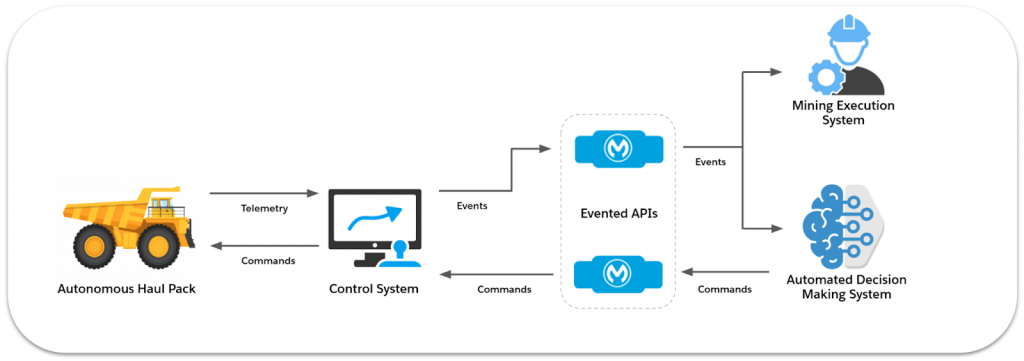For centuries, mining, oil, and gas companies have provided access to the wealth of resources underneath the earth’s surface to produce materials essential to human progress. Resources are a large part of our everyday lives, often in ways that we don’t stop to think about. For example, the device that you are reading this blog on contains more than 35 minerals.
With innovative technologies making it easy to connect the physical and digital worlds, resources companies — a sector comprised of mining, oil, and gas companies — are rapidly transforming the way that they operate.
Evented APIs provide resources companies with a modern approach to connecting applications, data, and devices.
Integrated technology is driving operational excellence
Resources companies seek operational excellence via cost reduction, increased productivity, improved safety, and sustainability. To achieve this, the leading mining, oil, and gas companies are leveraging cutting-edge technologies such as data-driven decision making and automation to bring smart mines, smart refineries, and smart rigs to life.
To realize the full potential of smart mines, refineries, and rigs, technology systems cannot work in isolation. They need to be integrated into the value chain, ultimately resulting in an autonomous feedback loop that incorporates smarter decision making in real time.
For example, automation is not just about moving autonomous vehicles between point A and point B. In a smart mine, vehicles are connected to other systems within the technology ecosystem so that smarter decisions are made faster.
These decisions can factor in the occurrence of all types of events and any associated impact. For example, an out-of-range event such as an abnormally high temperature reading on a haul pack mining truck sensor may require reducing the truck’s speed. This would result in haulage schedule changes and events that cascade throughout technology systems in the entire value chain.
Traditional approaches hinder real-time autonomy
The technology ecosystems within resource companies are inherently complex. Systems are geographically dispersed and operational technology assets including devices, sensors, and control systems are almost always segregated within dedicated air-gapped networks with poor physical connectivity.
Since the 1980s, resources companies have used historians (also known as data historians, process historians, and operational historians) to record and retrieve operational technology data. In recent years, the way that resources companies have used this data has changed significantly. Smart mines, rigs, and refineries demand real-time access to events and data in ways that historians aren’t designed to provide.
Let’s take a look at an example where a mining company wants to feed telemetry from an autonomous haul pack truck to an automated decision-making system.

The automated decision-making system can pull telemetry from the historian. However, because of the unidirectional nature of this approach, manual intervention is required to send any commands back to the autonomous haul pack; e.g. to reduce speed. Manual interaction adds latency to the process and erodes the autonomous feedback loop.
Evented APIs drive operational excellence
Resources companies that want to get the most value from their data will process it the instant that it is created. The longer that data is left unprocessed, the more it diminishes in value. Operational excellence can be driven by evented APIs that can produce, detect, consume, and react to events occurring within the technology ecosystem.
Evented APIs can be applied to our example use case to deliver an autonomous feedback loop that incorporates smarter decision making in real-time.

Evented APIs can deliver events to the automated decision-making system in real time as they occur. This bidirectional approach results in an autonomous feedback loop as the automated decision-making system can send commands back to the autonomous haul pack in real time without manual intervention.
Evented APIs introduce agility
Evented APIs provide a loosely coupled approach that introduces agility into the technology ecosystem. Producers of events aren’t concerned with knowing who the consumers or interested parties are nor what the subsequent processing is.
Looking at our example use case, a mining execution system (MES) can easily start consuming events that are already being published without any changes or impact to the existing technology components.

With such a loosely coupled approach, additional relevant events — such as autonomous train events in our example — can be introduced into the ecosystem just as easily.

Evented APIs are the future
Evented APIs extend the capabilities of traditional event-driven architectures by offering new levels of discovery, self-service, reuse, accelerated development, and governance. While this blog is focused on resources companies, the concepts discussed apply equally to other industries such as manufacturing, power, and utilities who share similar technology ecosystems.
Learn more about event-driven solutions and how to implement them.









